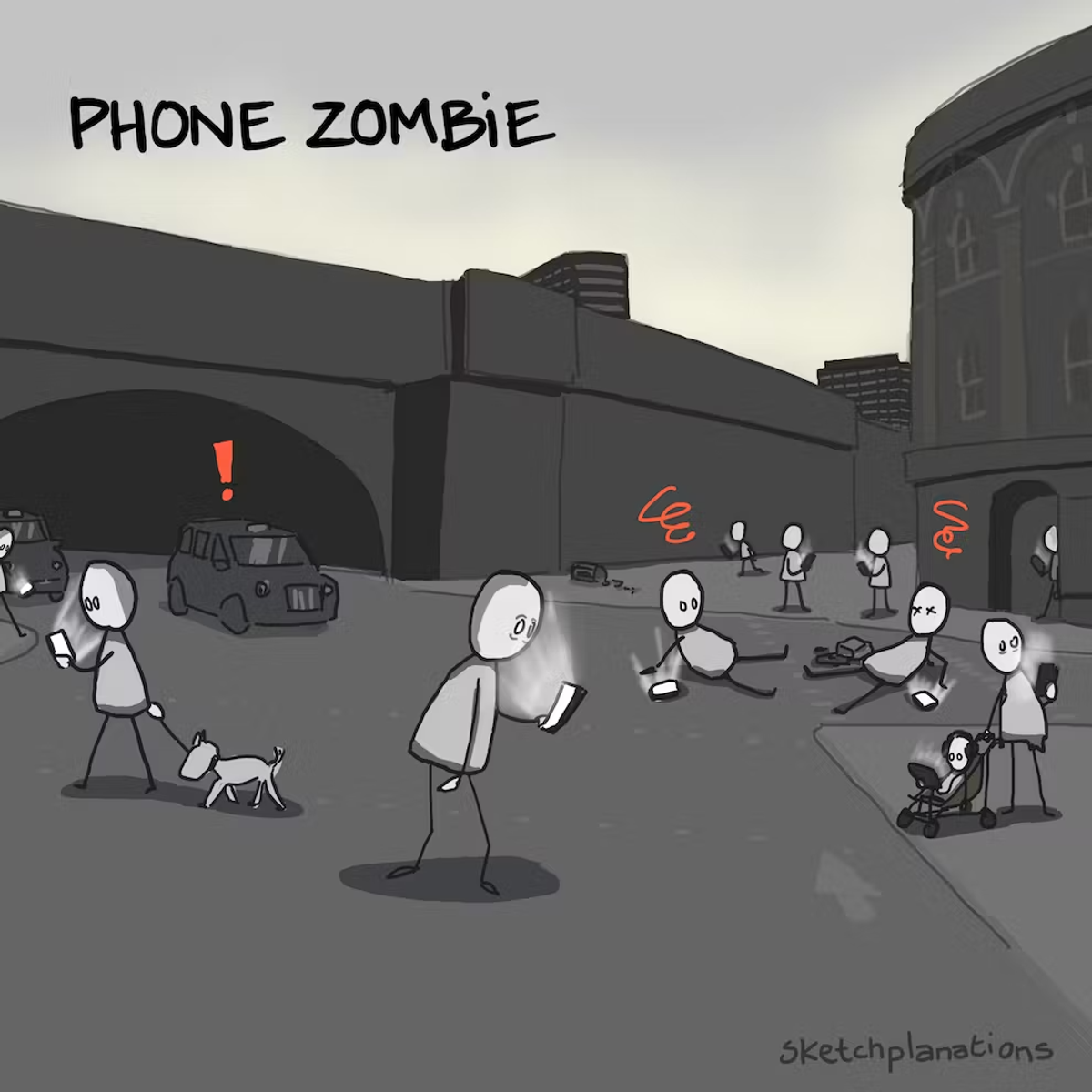Health News and Tips:

Phone Zombies:
A phone zombie is a regular pedestrian turned zombie walker because they’re busy staring at their phone.
Sometimes it’s hard not to—whether it’s a notification about where you’re about to meet, a message about something you just finished at work, texting to say you’re on your way home, a sudden thought to look something up (or perhaps you're reading a weekly newsletter 👀), or maybe it’s just switching the podcast. On a long, quiet street on my commute, I’ve also read a book while walking. There are so many reasons why it’s easy to turn into a phone zombie walking unthinkingly down the street.
Once, while waiting for a crossing light to change and checking train times on my phone, I noticed the people around me starting to cross. Taking my cue, I began to walk too, only realising a few steps later, with a car bearing down on me, that the light hadn’t changed to signal it was ok to cross. I’ve also seen people walk into cyclists, a near miss with a bus driving close to the curb, and someone tripping and falling. Take care, and don’t let it be you!
Also known as smartphone zombies or zombie pedestrians.
Playing The Piano Boosts Brain Processing Power And Helps Lift The Blues:
A new study published by researchers at the University of Bath
demonstrates the positive impact of learning to play a musical instrument
has on the brain's ability to process sights and sounds, and shows how
it can also help to lift a blue mood.
Publishing their findings in the academic journal Nature Scientific Reports, the team
behind the study shows how beginners who undertook piano lessons for just one hour a
week over 11 weeks reported significant improvements in recognising audio-visual
changes in the environment and reported less depression, stress and anxiety.
In the randomised control study, 31 adults were assigned to either music training,
music listening, or a control group. Individuals with no prior musical experiences or training were instructed to complete weekly one-hour sessions. Whilst the intervention groups played music, the control groups either listened to music or used the time to complete homework.
The researchers found that within just a few weeks of starting lessons*, people's ability to
process multisensory information -- i.e., sight and sound -- was enhanced. Improved
'multisensory process' has benefits for almost every activity we participate in -- from driving a car and crossing a road to finding someone in a crowd or watching TV.
These multisensory improvements extended beyond musical abilities. With musical
training, people's audio-visual processing became more accurate across other tasks.
Those who received piano lessons showed greater accuracy in tests where participants
were asked to determine whether sound and vision 'events' occurred at the same time.
This was true both for simple displays presenting flashes and beeps and for more
complex displays showing a person talking. Such fine-tuning of individuals' cognitive
abilities were not present for the music-listening group (where participants listened to the
same music as played by the music group), or for the non-music group (where members
studied or read).
In addition, the findings went beyond improvements in cognitive abilities, showing that
participants also had reduced depression, anxiety and stress scores after the training
compared to before it. The authors suggest that music training could be beneficial for
people with mental health difficulties, and further research is currently underway to test
this.
Cognitive psychologist and music specialist Dr Karin Petrini from the University of Bath's
Department of Psychology explained: "We know that playing and listening to music often
brings joy to our lives, but with this study, we were interested in learning more about the
direct effects a short period of music learning can have on our cognitive abilities.
"Learning to play an instrument like the piano is a complex task: it requires a musician to
read a score, generate movements and monitor the auditory and tactile feedback to adjust
their further actions. In scientific terms, the process couples visual with auditory cues and
results in multisensory training for individuals.
"The findings from our study suggest that this has a significant, positive impact on how the brain processes audio-visual information even in adulthood when brain plasticity is
reduced."
Notes
Each music training session included two segments. The first 20-minute segment
was dedicated to finger exercises. The second segment consisted of learning songs
from the ABRSM 2017-2018 piano grade one exam list for 40 minutes. All training
sessions were carried out on a one-to-one basis. Participants learned these pieces in
the order presented below. They proceeded to the next song once they could play
the former one correctly and fluently:
William Gillock A Stately Sarabande. Classic Piano Repertoire (Elementary).
Johann Christian Bach Aria in F, BWV Anh. II 131.
Giuseppe Verdi La donna è mobile (from Rigoletto).
Story Source:
Materials provided by University of Bath. Note: Content may be edited for style and length.
Journal Reference:
1. Yuqing Che, Crescent Jicol, Chris Ashwin, Karin Petrini. An RCT study showing few
weeks of music lessons enhance audio-visual temporal processing. Scientific
Reports, 2022; 12 (1) DOI: 10.1038/s41598-022-23340-4


